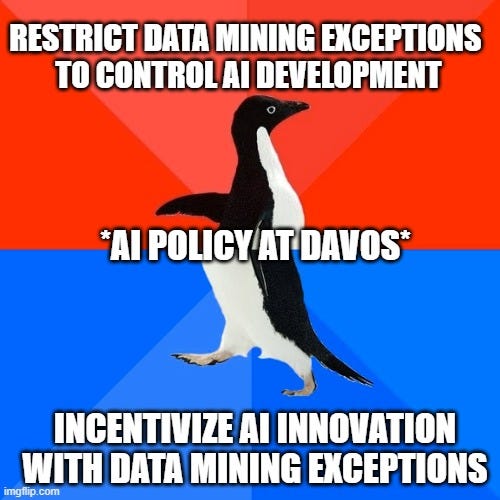Dear person reading:
What is on your mind this week? I’m mid-book through Cory Doctorow’s The Internet Con, but also having a great time at Baldur’s Gate. What about you?
Thanks for reading, as always! And onwards with your weekly roundup of the relevant trends, regulatory developments and policy insights, about the metaverse, AI, crypto, neurotech, and gaming.
👁️🗨️What's going on:
👀 => Apple Vision Pro hands-on, again, for the first time
“The virtual world inside the Vision Pro feels like a higher-resolution version of what Meta is trying to accomplish with the Quest but with a vastly more powerful M2-based computer to use inside.”
More on => theverge.com
🚩Also, good to remember that pre-orders requiere a mandatory FaceID scan with an IPhone or IPad
Magic Leap announced in a filing that Saudi Arabia’s Public Investment Fund has poured another $590 million in debt funding into the mixed reality headset maker.
“As more and more providers like Siemens, like Cisco jump into this game and provide that halo of having a hardened enterprise solution, combined with the cutting-edge technology, I think that’s definitely the recipe for adoption at scale.”
More on => venturebeat.com
👀 European Parliament resolution of 17 January 2024 on virtual worlds – opportunities, risks and policy implications for the single market
“although the European Commission’s communication does not yet indicate the need for precise legislative action, it is nevertheless important to make a careful assessment of all the issues relating to the development of virtual worlds and their effective coverage by existing legislation; underlines that a true digital single market can contribute decisively to the development of virtual worlds and strengthen the EU’s ability to compete globally; considers that a clear, comprehensive, regulatory framework is of vital importance, particularly when the technology reaches maturity, to ensure a level playing field that harnesses the full potential of virtual worlds and enables their economic growth;”
“Acknowledges that multiple virtual worlds have been developed by different
undertakings in the absence of open and common standards, regulations and
interoperable platforms; underlines that these virtual worlds are currently being developed by a limited number of undertakings that have the resources and funds necessary to develop them; considers that interoperability and open standards can contribute to the prevention of quasi-monopolies or abuses of dominant position to the detriment of consumers and to European businesses, especially SMEs;”
More on => europarl.europa.eu
As HoloLens vanishes from view, XREAL steps up and takes 51% of the augmented reality market
XREAL (formerly NREAL) creates AR glasses that look almost as regular glasses
🤖I Am Not A Robot: AI news
Figure's humanoid robots are about to enter the workforce at BMW
Figure has signed its first commercial deal, and is sending its general-purpose humanoid robots off to start real-world work at BMW's manufacturing plant in South Carolina.
More on => theguardian.com
In UK, music industry lobby succeeded in pushing the goverment to retract the plan of having a broad text and data mining exemption to copyright.
“We recommend that the Government does not pursue plans for a broad text and data mining exemption to copyright. Instead, the Government should proactively support small AI developers in particular, who may find difficulties in acquiring licences, by reviewing how licensing schemes can be introduced for technical material and how mutually-beneficial arrangements can be struck with rights management organisations and creative industries
trade bodies”
More on => parliament.uk
Meanwhile, Australian government is considering the copyright implications of generative AI
As content producers around the world, including movie studios and record labels, call for licensing agreements, Industry and science minister, Ed Husic, has left the door open for creatives or publishers to receive payments if their work is used to “train” artificial intelligence platforms.
More on => theguardian.com
Noveslist wins awards and then reveals she used ChatGPT
The latest recipient of one of Japan's most prestigious literary awards, the Akutagawa Prize, has admitted to using AI to write parts of her novel, The Tokyo Tower of Sympathy, which was deemed “flawless” by judges.
"I would say about five percent of the book quoted verbatim the sentences generated by AI,"
More on => futurism.com
‘Impossible’ to create AI tools like ChatGPT without copyrighted material, OpenAI says
More on => theguardian.com
but wait, there is more!
Anthropic hits back at music publishers in AI copyright lawsuit, accusing them of ‘volitional conduct’ More on => venturebeat.cm
🚩=> OpenAI quietly deleted language expressly prohibiting the use of its technology for military purposes from its usage policy
Up until January 10, OpenAI’s “usage policies” pageOpens in a new tab included a ban on “activity that has high risk of physical harm, including,” specifically, “weapons development” and “military and warfare.”
An OpenAI spokesperson said in an email to The Intercept “that OpenAI wanted to pursue certain “national security use cases that align with our mission,” citing a plan to create “cybersecurity tools” with DARPA, and that “the goal with our policy update is to provide clarity and the ability to have these discussions.”
More on =>theintercept.com
🤦The WTF award of the week goes to…
I'm Sorry Dave, I'm Afraid I Can't Do That
Companies are hastily using ChatGPT to whip up entire product descriptions, including the names — without doing any degree of proofreading — in a likely failed attempt to optimize them for search engines and boost their discoverability.
More on => futurism.com
😬Meme corner:
🎮Gaming news
GDC published its State of the Game Industry 2024 report, notable results include:
4 in 5 developers have ethical concerns about Generative AI
56% of developers are worried about future layoffs
26% of AAA developers have games being adapted into movies or shows
+26% increase in games with accessibility measures
Younger devs are 157% more likely than older devs to support unionization
More on => gdconf.com
(On light of #1, please excuse this shameless plug to our GDC session “ARTificial: Ethics and Aesthetics of AI and Copyright” )
Half-Life YouTuber plans lawsuit against Ubisoft for killing The Crew
YouTuber and film-maker behind Ross Scott is planning a class-action lawsuit against Ubisoft over the shutdown of racing game The Crew.
He claims that the closure of The Crew’s servers, scheduled for Sunday March 31, represents a “gray area” in videogame consumer law that he would like to challenge.
Scott’s argument is that since The Crew is only playable online, after the game’s servers are closed, it will no longer be accessible to anybody who owns it, whether digitally or via a physical copy. “We were being sold a good, not a service”.
Why does it matter to the metaverse?
This is very interesting legal challenge to digital property and licensing, trough consumer rights, as there is still no legal consensus on wether or how IP law’s “first sale” principle applies to digital goods.
TLDR: “owning” an e-book doesn’t grant you the same rights that owning a physical book does.
Even when both carry exactly the same text, technically they are not legally the same. In the physical world, thanks to what’s called “exhaustion” o “first sale doctrine”, once you buy an item containing copyrighted content, the copyright owner can not prevent you from reselling, lending or gifting that item. You can not create unauthorized copies, but you can do whatever you want with your copy. (more here)
Keep this in your radar, as it might have potential effects to metaverse and live services shutting down. And interestingly, it comes at a time when Ubisoft has recently said that “Gamers Should Get More Comfortable Not Owning Their Games”.
For more on videogames preservation check EFF´s archive.
✍️Ending nugget:
"“Agreeing on some portable token which can be easily exchanged as a unit of value is a well-known and widely reproduced historical means of achieving fairness in exchange, but has two important flaws: The first is that the production and distribution of these tokens may initially or eventually become manipulated or controlled in a way that is broadly perceived as unfair. The second is that in all free markets, independent of the skills or intentions of individuals, money tends to move toward those who already have it, leading to growing wealth inequality and therefore broadly perceived unfairness .”
“FairShare: a self-regulating digital currency managed by groups” by
That’s all for now! To continue the conversation, find me at https://linktr.ee/abogamer. And if you want to support my work (and feed my cats :)🐱 please consider sharing and subscribing to this newsletter!!














